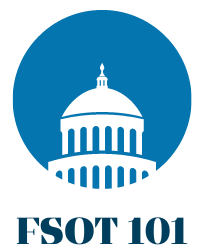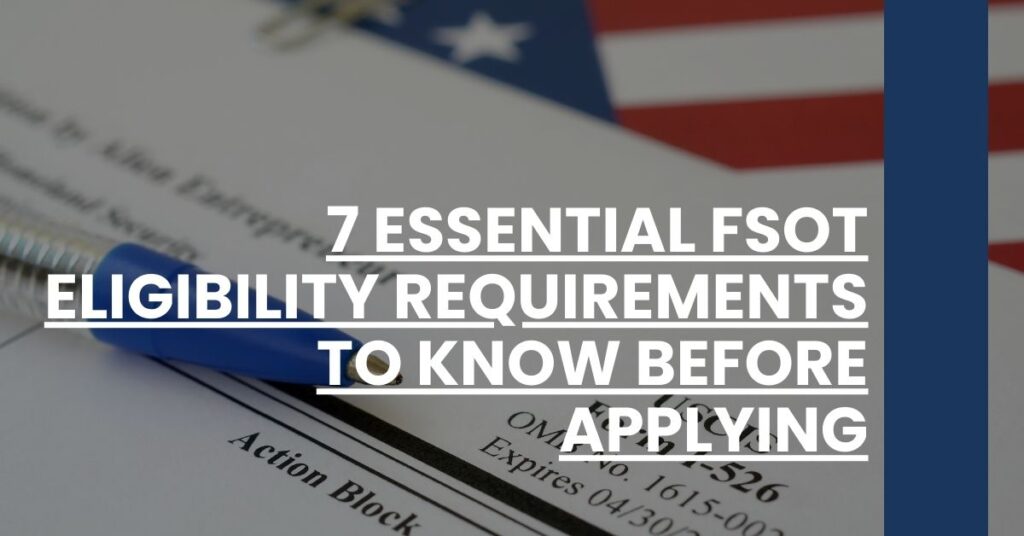Ever dreamt of representing your country on the global stage? The Foreign Service Officer Test (FSOT) is your gateway, but navigating the fsot eligibility requirements is crucial.
This post demystifies the prerequisites, from citizenship to experience, ensuring you’re on the right path to diplomatic service.
No filler or fluff, just the essentials you need for a successful FSOT application.
- 1. Meet Basic U.S. Employment Standards
- 2. Hold the Necessary Education Credentials
- 3. Pass the Age and Experience Checkpoint
- 4. Understand the Medical and Security Clearances
- 5. Demonstrate International Experience and Adaptability
- 6. Register for the Test Within the Open Periods
- 7. Prepare for a Multifaceted Evaluation Process
- How to Pass the Medical and Security Clearance Portion
- Conclusion: Launching Your Foreign Service Career
1. Meet Basic U.S. Employment Standards
As you venture into the realm of diplomacy and international affairs, understanding the FSOT eligibility requirements is your first crucial step. These standards are not merely boxes to tick; they represent your commitment to representing and upholding the values of the United States globally. Let’s unpack these primary criteria:
- U.S. Citizenship: At the heart of the FSOT eligibility lies undeniable proof of your U.S. citizenship, which must be in place at the time of your application submission. This requirement underscores the trust and responsibilities endowed upon you as an American citizen.
- Age Requirements: Age is more than a number here; it reflects readiness and maturity. You must be at least 20 years old when you submit your registration and under 60 when appointed. Rest assured, it’s never too late to begin this journey—as long as you’re also not older than 59 at submission. Aligning with the State Department’s directives ensures that you have a long and fruitful career ahead, before the mandatory retirement age comes into play.
Commit these foundational requirements to memory—they are the bedrock upon which your international career will be built.
2. Hold the Necessary Education Credentials
When gearing up for the FSOT, education often comes under the spotlight. While there is no singular academic path carved out for prospective Foreign Service Officers, broadening your educational horizon is advantageous. Here’s how you can align your academic qualifications with the FSOT eligibility criteria:
The narrative that floats around about educational prerequisites is nuanced:
- Variety of Degrees Welcome: The majority of applicants brandish a bachelor’s degree or higher, but specific degrees are not a mandate. Embrace your education, whether it’s rooted in international relations, economics, political science, or any field that has honed skills relevant to diplomacy and representation.
- Cross-disciplinary Advantage: Your unique educational background contributes to a vibrant tapestry of perspectives, crucial for addressing complex global issues and enhancing the United States’ standing worldwide.
Remember, your academic journey injects diversity and strength into the Foreign Service; cherish and leverage it.
3. Pass the Age and Experience Checkpoint
Your professional portfolio plays a substantial role in meeting the FSOT eligibility requirements. The timeline of your life and career paints a picture of the experience you bring to the table—an experience that can be dispensed across seas and borders. Reflect on these facets:
- Leadership Roles: Any positions you’ve honed your leadership skills in can set you apart.
- Diverse Work Experience: Varied job experiences, especially in relevant sectors such as management or consular roles, illustrate your adaptability—a trait highly valued in Foreign Service Officers. The richness of your professional background aligns with the broad spectrum of challenges FSOs encounter.
Consider every piece of your professional tapestry to be a building block to your future success in international service.
4. Understand the Medical and Security Clearances
The journey to become a Foreign Service Officer encompasses stringent FSOT eligibility requirements that reach beyond academia and experience. Your well-being and integrity are of utmost importance, as noted in these key clearance aspects:
- Medical Evaluation: A clean bill of health is a non-negotiable. This doesn’t just mean being fit today; it means being fit for service across various environments and situations. The medical exam will probe your history, ensuring you’re up for the challenge, anywhere, anytime.
- Top Secret Security Clearance: Expect a thorough examination of your background. Every nook of your history will be scoured for evidence of your trustworthiness, reliability, and judgment. Your ability to obtain a Top Secret security clearance is as crucial as any test you’ll take on your path to diplomacy.
Approach these evaluations with transparency and attention to detail; they’re as integral to your application as your education and professional experience.
5. Demonstrate International Experience and Adaptability
Your adaptability and international experience are not just attractive qualities; they’re fundamental fsot eligibility requirements. These experiences signal to the selection panels that you have the resilience, cultural sensitivity, and diplomatic acumen to thrive in foreign environments. Here’s why this matters:
- Cultural Adaptability: It’s all about being comfortable in your skin, no matter where you are in the world. Demonstrating that you’ve successfully navigated diverse cultural landscapes – maybe you’ve studied abroad, worked internationally, or engaged in significant travel – speaks volumes. These experiences underscore your ability to build alliances and promote peace, qualities that align with the core mission of a Foreign Service Officer.
- International Experience: If your resume includes foreign language proficiency or experience working in multinational settings, you’re showcasing your readiness for global duties. The more you’re exposed to and understand different cultural dynamics, the better you can fulfill your role in promoting U.S. interests abroad.
Embrace your global journey; it’s proof that you can carry the mantle of U.S. diplomacy with grace and expertise.
6. Register for the Test Within the Open Periods
Navigating the FSOT isn’t just about readiness; timing is critical. Register for the test during the designated periods – failure to do so could delay your plans by months, or even a year. Pay close attention to:
- Registration Dates: Usually, there’s a five-week window to register before each test cycle. Miss this window and you’ll have to wait until the next one opens.
- The Registration Process: Completing your application and choosing an exam slot should be done methodically. This registration process is conducted online through Pearson VUE, and paying attention to detail here is key to avoiding errors that could cost you precious time.
Mark your calendar, set reminders, and treat the registration deadlines with as much seriousness as the test itself.
7. Prepare for a Multifaceted Evaluation Process
Once the FSOT is in your rearview mirror, don’t rest on your laurels. The multifaceted evaluation process that follows is where your candidacy is truly put to the test. Your readiness to serve at a global capacity is vetted through:
- Qualifications Evaluation Panel (QEP): This is where your personal narratives and application essays come into play. Be sincere, be compelling. Your narrative should paint a vivid picture of your qualifications, public service, and leadership potential.
- Oral Assessment: Here, you’re assessed not just on what you say, but how you say it. Diplomacy is about persuasive communication and cementing your place in the ranks requires a combination of eloquence, confidence, and presence.
- Clearances and Review Panel: Achieving top-notch medical and security clearances is followed by the Suitability Review Panel, ensuring your alignment with the principles and standards of the Foreign Service.
This series of evaluations is rigorous, but it’s designed to ensure that the best and most qualified candidates are selected.
How to Pass the Medical and Security Clearance Portion
When you reach the medical and security clearance phase, it’s time for transparency and thoroughness. Be prepared for this critical step, as it will require:
- Full Disclosure: Be honest about your medical history and forthcoming with any issues that might affect your security clearance.
- Prompt Information Sharing: Gather all necessary documents and inform your references and past employers that they may be contacted. This proactive approach can significantly smooth out the clearance process.
- Patience: Security clearance can be lengthy. Maintain a positive outlook and avoid stressing over the time it takes.
Remember, every piece of information counts, and your honesty is a measure of your integrity.
Conclusion: Launching Your Foreign Service Career
The path to becoming a Foreign Service Officer is thorough for a reason – it ensures that the individuals selected can effectively advance U.S. interests and thrive in the global arena. As you gear up to meet each of the fsot eligibility requirements, approach them not as hurdles, but as stepping stones to a rewarding career filled with unique challenges and opportunities.
In essence, your preparation, from understanding the application process to embodying the qualities of an FSO, is an investment in your future. Should you have the will and readiness to pursue this path, take the first step with confidence and determination.
Your potential future as a global representative awaits; prepare diligently, apply strategically, and may your journey be as impactful as the role you seek to fill.
FSOT eligibility requirements guide: Discover essential criteria to qualify for the Foreign Service Officer Test and start your career.

